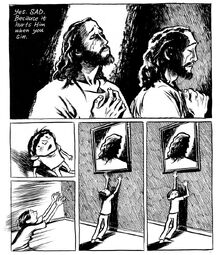Blankets has two recurring themes throughout it's narrative. These themes are rejection and acceptance.
Rejection[]
Craig Thompson over the course of his life was forced to deal with rejection on a daily basis. This was caused by several factors. The first factor that made Thompson feel rejected was caused by his schoolmates mocking him. Thompson's schoolmates picked on him for any reason they could find, including his family's poverty, his skinny body, and his hair. This lead to Thompson feeling rejected and isolated from other people.
Thompson also experienced rejection at the hands of his first love, Raina. Raina, shortly after Thompson went back to his home, decided to end their relationship. This was Thompson's first romantic rejection and the only one he mentions in the memoir. This caused Thompson a lot of pain. However, this rejection was not the only he experienced with Raina. During their time together, Thompson commented on Raina feeling distant from him, particularly when they attended parties with her friends.

Jesus Turning Away from Craig retrieved from Thompson, C. (2003). Blankets: A graphic novel (p.208). Marietta, Georgia: Top Shelf.
Religion also became a source of rejection for Thompson. He would often feel intense shame when he committed a sin, and would envision Jesus crying or turning away from him. This lead to Thompson experiencing feelings of guilt whenever he performed an act that deviated from his parents fundamentalist Christian teachings. A notable instance of this is when Thompson drew a naked woman as a young boy. His parents expressed their disappointment and explained that he was hurtin Jesus. This lead to Thompson feeling rejected by Jesus.
Christianity was also something that Thompson eventually rejected from his life. At the end of the memoir Thompson explains that because of his experiences, he no longer believes in the religion that his parents taught him, and that for him, religion was something that was personal and to be experienced by an individual. This is a fact he is afraid to reveal to his parents because he believes that they will in turn reject him.
Thompson also rejected his memories. Twice during this memoir, Thompson attempts to burn his memories away so that he does not have to experience the pain they cause him. He rejects his past choices and seeks to leave them behind.
Acceptance[]
The theme of acceptance is also a recurring theme throughout the memoir, and goes hand in hand with the theme of rejection. Throughout the memoir, the reader witnesses Thompson feel rejected wherever he goes. It isn't until Thompson meets Raina that he experiences acceptance for the first time. It's because of this that Thompson's focus becomes all about Raina. Raina accepted Thompson for who he was, and became the first person he was able to become intimate with. She accepted him in the most beautiful way a person can accept another person.
This also lead to another instance of acceptance in which he is able to accept his own sexuality. Thompson believed that experiencing his sexuality, which was a sin, would hurt Jesus. However, in becoming intimate with Raina, he envisions Jesus as being happy for him rather than turning his back on him. Thompson accepting that his sexuality was not something he had to be ashamed of also lead him to his next acceptance.
Throughout the memoir, it was clear that Thompson had issues with his faith. Thompson believed that his faith was a personal choice and something he should experience on his own. When Thompson grew up, he accepted that he did not agree with his parent's faith, and chose to step away from their branch of Christianity.
The final acceptance we see from Thompson is that acceptance of his memories. Despite twice burning his memories in an attempt to forget, we see that as an adult, Thompson rediscovers Raina's quilt, an object he was implied to have burned. This discovery indicates that Thompson was not willing to relinquish all of his memories and that he is now old enough to accept his past.
References[]
Thompson, C. (2003). Blankets: A graphic novel. Marietta, Georgia: Top Shelf.